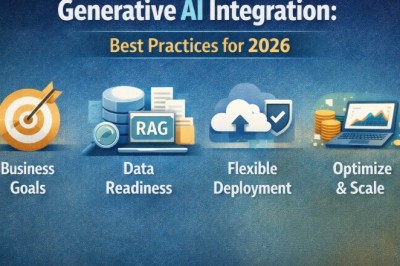views

In today's data-rich environment, businesses can access vast amounts of information. However, the real value lies in how that data drives decision-making processes. Data-driven decision-making has become a critical aspect of modern business strategy, enabling organizations to make informed, objective, and strategic choices. By leveraging data insights, businesses can gain a competitive advantage, improve operational efficiency, and better understand customer behavior. Here are a few things you need to know about the importance of data-driven decision-making for businesses and how it can transform how organizations operate and succeed.

Objective decision-making
Data-driven decision-making brings objectivity to the decision-making process. Rather than relying on gut feelings or intuition, decisions are based on empirical evidence and facts. This eliminates biases and personal opinions that can often cloud judgment. By utilizing data, businesses can make more objective decisions supported by concrete evidence, increasing the likelihood of favorable outcomes.
Improved operational efficiency
Data-driven decision-making can significantly improve operational efficiency within an organization. By analyzing operational data, businesses can identify bottlenecks, inefficiencies, and areas of improvement. This information enables organizations to streamline processes, allocate resources more effectively, and identify cost-saving opportunities. Data insights can also facilitate predictive maintenance, enabling businesses to address maintenance issues before they become costly problems proactively. By optimizing operations through data-driven decision-making, businesses can enhance productivity and reduce operational costs.

Competitive advantage
Developing a competitive edge is essential for success in the cutthroat corporate environment of today. Businesses benefit greatly from data-driven decision-making since it allows for rapid and informed decision-making. Organizations may spot market trends, monitor rival activity, and find fresh growth prospects using data insights. Businesses can gain an advantage over their competitors by reacting to market developments quickly and accurately.
Risk mitigation
Data-driven decision-making helps businesses mitigate risks by providing valuable insights and predictive analytics. By analyzing historical data and market trends, organizations can identify potential risks, anticipate challenges, and develop contingency plans. This proactive approach allows businesses to make decisions that minimize risks and maximize opportunities. With data-driven insights, organizations can make strategic choices that reduce uncertainty and enhance long-term stability.

Improved strategic planning
Data-driven decision-making enables businesses to develop more effective and informed strategic plans. By analyzing relevant data, organizations can identify trends, patterns, and market dynamics that may impact their industry or target audience. This information allows businesses to adapt their strategies accordingly, capitalize on emerging opportunities, and mitigate potential risks. With data-driven insights, businesses can make more accurate predictions and align their goals with market demands, resulting in more successful strategic planning. Doing this is easy by assessing data properly, but not everyone knows how to make that happen. That’s why you might need to look for people who know all about business intelligence solutions and how to make the most of this idea to help you make informed decisions and boost your business.
Continuous improvement
Data-driven decision-making promotes a culture of continuous improvement within organizations. By regularly analyzing data and measuring key performance indicators (KPIs), businesses can monitor their progress and identify areas for improvement. Data insights provide valuable feedback that allows organizations to make adjustments, refine strategies, and optimize performance. This iterative process of analyzing data, making informed decisions, and evaluating outcomes are the things that drive continuous improvement and foster a culture of learning within the organization.

Measurable results and accountability
Data-driven decision-making allows businesses to track and measure the outcomes of their decisions. By establishing relevant metrics and performance indicators, organizations can monitor the impact of their choices and assess their effectiveness. This provides a clear understanding of the return on investment (ROI) and allows businesses to be accountable for their decisions. By tying decisions to measurable results, businesses can learn from successes and failures, adjust their strategies accordingly, and continuously refine their decision-making processes.
Data-driven decision-making has become a critical component of modern business strategy. By utilizing data insights, businesses can make objective decisions, improve strategic planning, enhance customer understanding, optimize operations, gain a competitive advantage, mitigate risks, foster continuous improvement, and establish measurable results. Organizations prioritizing data-driven decision-making can make more informed choices, adapt to changing market dynamics, and position themselves for long-term success. Embracing a data-driven culture enables businesses to harness the power of data and transform how they operate in an increasingly data-centric world.


























Comments
0 comment